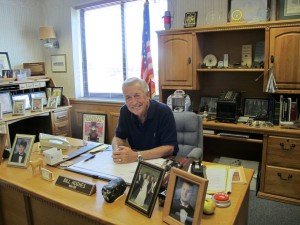By Casey Brown and Margaret Bryant, 2013
Not many children will lie and claim they are Native Americans. When Kim Provost, owner and founder of Hunters and Gatherers in Brevard, NC, was about six years old, her grandmother gave her a piece of Native American jewelry with the signature turquoise stone. That sparked her fascination with Native American culture, especially its artifacts like jewelry and artwork. Now, her appreciation, love, and fascination with the culture and art have translated in her professional life and in her store.
When we arrived in Brevard, we promised each other we would stop at any store that looked interesting. We wanted the authentic small town experience on our last day in the mountains. But at first, we hadn’t had that great of luck. As we wandered down the road, we came across a mariachi guitar player named Bobby who was sitting outside of a sandwich shop. While talking to us, he mentioned he would be performing outside of his friend’s store to support her political campaign. He was referring to Hunters and Gatherers, the little hole in the wall shop, nestled amongst iconic small town stores like Brevard’s Celestial Mountain Music and the White Squirrel Shoppe. The sign proudly declared that it was a “Made in the USA” established. Intrigued, we decided to check it out.
When we entered, it felt as if we had just crossed over the threshold into crafty wonderland. Shelves and tables overflowed with trinkets, pottery, and tiki candles made from Heineken bottles while handmade leather goods, like belts and shoulder bags, hung thoughtfully from hooks and racks lining the walls of various sections of the store. We wandered through narrow hallways, a result of all of the items packed closely together, careful not to knock anything out of place. The rich leathers and vibrant turquoise jewelry accents the rest of the items nicely.
When Kim first opened the store eight years ago, she had to settle on only a portion of her inventory fitting the image of the store, while the rest was what she considered as cutesy. She explained that “cute” items got her off the ground, though it wasn’t ideal. She clarified that she is not a purist. We would define her more as homegrown. In the shop’s first few years, she had to hunt down artists and crafters, which was tiresome in addition to running and working at the store. Now, they come to her.
Currently, there are close to forty local artists and crafters and over one hundred additional artists across the country. Most made in the USA stores are currently online and although Hunters and Gatherers has a website, Kim is proud of the fact that they operate in house. After speaking with her for little over an hour, and being shown around the store, it is clear that the store is a beautiful reflection of its creator.
For Kim, the store is not only an extension of her personality, but it has also been a place where those close to her could gain artistic recognition. One of those people is her mother. A longtime painter, she had hundreds of different sized paintings of wolves, horses, flowers and other natural settings, all lying around the house. With Hunters and Gatherers, Kim has offered her mother a place to hang her work and since then, her mother has had many of her pieces sold.
“I don’t think [pieces] are worth buying when they’re on their own,” Kim said, referring to the more enlightened art purchasing experience a person can have when they can see a full collection of an artist’s work. This is why Kim sets up separate nooks for each artist in various parts of her store. Her mother’s section takes up half the length of the store’s back wall.
Kim Provost grew up in Detroit, MI and attended Michigan State University. Throughout her life, she planned on pursuing a variety of careers. Originally, she was going to be an attorney, but then Kim changed her mind. She wanted to be a forest park ranger. So, she switched her major to Natural Resources and Outdoor Education and after graduation, she searched for jobs in Alaska and fell in love with the outdoors, eventually becoming an outdoor educator.
However, in 1988, she asked her boss if she could attend an outdoor education conference in North Carolina. Her boss was hesitant, knowing how easy it is to fall in love with North Carolina landscape and the quaint Southern lifestyle. Kim assured him that this would never happen. She went to the conference and when she returned, she put her letter of resignation on her boss’ desk. She was moving to North Carolina.
After talking to Kim for close to an hour, she gave a personalized tour of Hunters and Gatherers. Each section of the store had a story worth telling. Kim showed us the leather cowboy boots, belts and other accessories that she had just shown at a rodeo. They attend every year. Towards the end of our tour, a mild-mannered friend of Kim’s came into the store. As it turns out, she is one of the featured artisans at Hunters and Gatherers. Her craft is making jams and she spoke very highly and proudly of Kim and her work. It was clear to us what a special impact Kim’s dream has had on the community of Brevard.
Now, after nearly 25 years working and living in Brevard, Kim is running for Brevard City Council. She wears her candidate pin broadly. For her, running for office was the obvious next step to give back to the small town that has given her so much.
“It’s my time to step up and serve my community,” Kim said. “I’ve been able to have my dreams come true, and I want to keep Brevard a cool place.”

